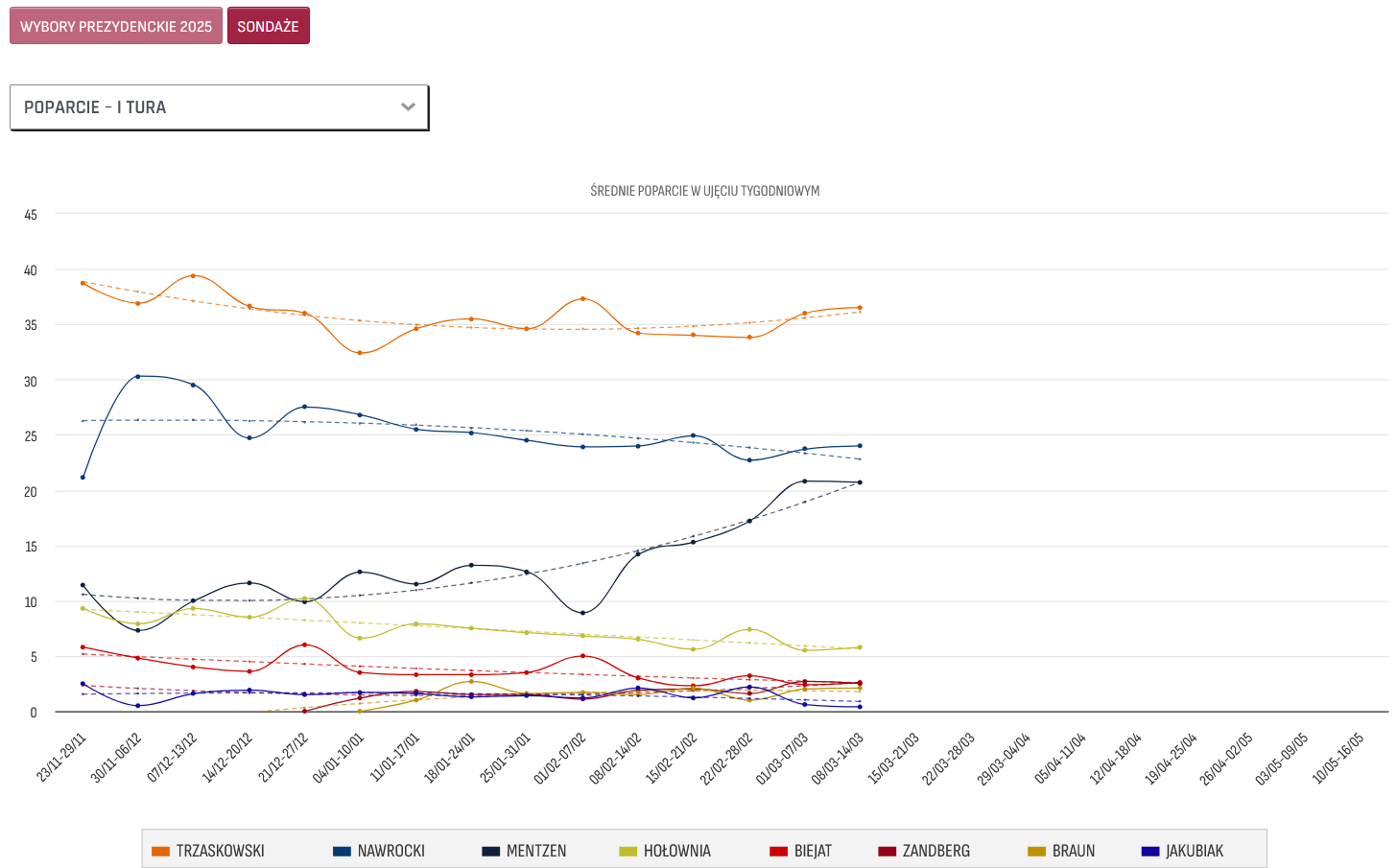Keep our news free from ads and paywalls by making a donation to support our work!

Notes from Poland is run by a small editorial team and is published by an independent, non-profit foundation that is funded through donations from our readers. We cannot do what we do without your support.
One of the leading candidates in Poland’s presidential race – Sławomir Mentzen of the far-right Confederation (Konfederacja) party – has sparked debate by calling for all universities in Poland to charge tuition fees to students.
His suggestion has been rejected by all of his main rival candidates from the left, right and centre, who say that it would limit education opportunities, especially for poorer students from smaller towns.
In Poland, public universities, which are generally more prestigious than private ones, do not charge tuition fees to most students, with the costs covered by the state. Only around a quarter of all students study at private universities.
Mentzen: Studia powinny być płatne
Nie wydaje ci się, że odcinasz możliwości biedniejszym ludziom?
– Nie. Mogą mieć stypendium
Czy przeciętna osoba, której rodzice ledwo wiążą koniec z końcem, powinna mieć obowiązek zapłaty za studia?
– W moim świecie idealnym studia są płatne. pic.twitter.com/K4MllHD3gA— gromota (@gromotapl) March 26, 2025
In an interview this week with online broadcaster Kanał Zero, Mentzen – who is known for promoting free-market, libertarian economic policies – said he believes that, “in an ideal world, studies should be paid for” by students, citing the examples of tuition fees in the United Kingdom and United States.
Mentzen argued that the current system actually exacerbates inequalities because “poor people tend to pay for their studies” at less prestigious private universities, “while richer people get their studies for free…because they have more money for tutoring, more educational opportunities”.
He also pointed to the problem of students getting their education for free in Poland before emigrating to work and pay taxes in western Europe after graduating. This often happens with doctors, said Mentzen, who is currently running third in the polls for May’s presidential election, with average support of around 21%.
“We have a problem that in Poland, doctors often graduate from studies on which the Polish state spends very large amounts of money and they go to the West,” he said. “I don’t really understand what interest we have in funding someone’s education.”
Although Mentzen said that he also supports offering scholarships for poorer students, his remarks triggered a backlash from his political rivals, who argued that introducing tuition fees would worsen inequality and limit access to higher education.
Rafał Trzaskowski, the candidate of Poland’s main ruling centrist Civic Coalition (KO) and who is the frontrunner in the polls, on around 37%, said that free university studies are “a huge achievement for our country and our democracy”.
“Is this a proposal for young people? That they should pay for their studies? Is this common sense? In today’s situation, when we need an educated society? For real?” he asked during a meeting with voters in the city of Kutno, quoted by the Gazeta Wyborcza daily.

Weekly rolling average support in polls for the main candidates in Poland’s presidential election compiled by ewybory.eu
Meanwhile, Karol Nawrocki – the candidate backed by the main national-conservative opposition, Law and Justice (PiS), and who is currently just ahead of Mentzen on around 24% support – warned that tuition fees would restrict educational opportunities for many students.
“Poles would not be happy with this change. Paid studies would be a big mistake. It would be even harder for young people to get an education and succeed,” Nawrocki said in a video posted on X.
He pledged that, if elected, he would not agree to the introduction of tuition fees. “The Polish president should do everything to reduce social inequalities, and not deepen them,” said Nawrocki.
Nie zgodzę się na płatne studia.
Prezydent RP powinien robić wszystko, żeby zmniejszać nierówności społeczne, a nie je pogłębiać. Dlatego nie zgodzę się na likwidację bezpłatnej edukacji. pic.twitter.com/SXnams4BF8— Karol Nawrocki (@NawrockiKn) March 28, 2025
Magdalena Biejat, the candidate of The Left (Lewica), one of KO’s allies in the ruling coalition, also argued that tuition fees would harm students from poorer backgrounds.
“There are already people who choose not to go to university because they cannot afford to live in a big city. Sławomir Mentzen wants to add university fees to that,” Biejat said in a video posted on TikTok. “I wonder how would that improve the situation for people from smaller towns and less affluent families.”
Another left-wing candidate, Adrian Zandberg of the Together (Razem) party, echoed Biejat’s concerns, saying Mentzen’s idea would give “students from poorer families and smaller towns even smaller chances of getting ahead”, reports state broadcaster TVP.
Both Biejat and Zandberg are outsiders in the presidential race, each polling support of around 2.5%.
@magdabiejat Mentzen płatnymi studiami chce odebrać ludziom marzenia‼️ Zatrzymaj ze mną falę brunatnego zamordyzmu w jego wykonaniu, głosuj na mnie 18 maja! 💚 #lewica #biejat #biejat2025 #mentzen @__Lewica ♬ dźwięk oryginalny – Magdalena Biejat
Another candidate, Szymon Hołownia of the centrist Poland 2050 (Polska 2050), who has support of around 6%, called Menzten’s proposal “nonsense”, reports news website Onet.
Hołownia argued that the far-right candidate’s programme more broadly – with its emphasis on slashing taxes and public spending – would be a “nightmare for many millions of young people in Poland”. He called Mentzen’s ideas “social cannibalism” in which “the rich will eat the weaker”.
Mentzen has surged in the polls in recent weeks, rising from support of around 10% at the start of the year to around double that figure now, with particularly strong support among young people. That has turned what many thought would be a two-horse race between Trzaskowski and Nawrocki into a three-way contest.
The first round of the election will be held on 18 May. Should no candidate win more than 50% of the vote – as seems certain to happen – the top two will then move into a second-round run-off on 1 June.
Radical-right freemarket candidate @SlawomirMentzen has transformed a presidential election most assumed would be a two-horse race
Without a government record to defend, he has challenged the duopoly that dominates Polish politics, writes @AleksSzczerbiak https://t.co/hh9hnYmGB6
— Notes from Poland 🇵🇱 (@notesfrompoland) March 27, 2025

Notes from Poland is run by a small editorial team and published by an independent, non-profit foundation that is funded through donations from our readers. We cannot do what we do without your support.
Main image credit: Kozminski University/Flickr (under CC BY-NC-ND 2.0)

Alicja Ptak is deputy editor-in-chief of Notes from Poland and a multimedia journalist. She has written for Clean Energy Wire and The Times, and she hosts her own podcast, The Warsaw Wire, on Poland’s economy and energy sector. She previously worked for Reuters.



















